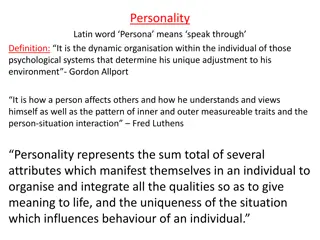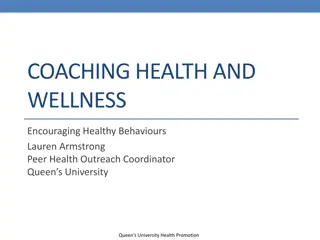
Understanding Influences on Intelligence - Heredity vs. Environment
Explore the impact of heredity and environment on intelligence, delving into genetic influences, environmental factors, and the interplay between nature and nurture. Discover how genetic and family heredity, as well as the upbringing environment, shape a person's intelligence level.
Download Presentation

Please find below an Image/Link to download the presentation.
The content on the website is provided AS IS for your information and personal use only. It may not be sold, licensed, or shared on other websites without obtaining consent from the author. If you encounter any issues during the download, it is possible that the publisher has removed the file from their server.
You are allowed to download the files provided on this website for personal or commercial use, subject to the condition that they are used lawfully. All files are the property of their respective owners.
The content on the website is provided AS IS for your information and personal use only. It may not be sold, licensed, or shared on other websites without obtaining consent from the author.
E N D
Presentation Transcript
StudyMafia.Org Heredity & Environment Influence on Intelligence Submitted Studymafia.org Studymafia.org Submitted To: To: Submitted Submitted By: By: Studymafia.org Studymafia.org
Table Contents Definition Introduction Evidence of Genetic Influences on Intelligence Evidence of Environmental Influences on Intelligence Conclusion 2
Definition Hereditary influences on intelligence arise through genetic and family heredity, while the environment is another factor, wherein what environment the child is raised in (open/closed/traditional/modern ) impacts the intelligence level of the child. 3
Introduction We often find that intelligence differs among people and not everyone is equally intelligent in everything. This is because of the different factors influences we have on intelligence. Our genetics, biological family, heredity, environment in which we were raised in our childhood, people we meet, and what we experience are the determining factors of intelligence to be higher or lower. 4
Introduction Intelligence is a three-dimensional topic that is learned, recognize, and apply. Intelligence is a cognitive ability of a person for carrying out day-to-day cognitive processes. Person observes, learns, interprets, perceives, and applies the knowledge from the information he has. It can be gained through academic learning and experience/life-based learning. 5
Introduction This also implies problem-solving, planning, decision-making, creativity, critical thinking, and others. Intelligence is generally categorized into two- general intelligence and specific intelligence. General intelligence is general cognitive ability while specific intelligence is related to physical skills, linguistic skills, interpersonal intelligence, visual-spatial intelligence, and others. 6
Evidence of Genetic Influences on Intelligence Studies show that IQ scores of identical twins may be more similar than those of fraternal twins. Siblings who were raised together in the same environment have more similar IQs than those of adopted children who were brought up in the same household. 8
Evidence of Genetic Influences on Intelligence Heritability is a mathematically derived estimate about trait variation in a person s genes. These largely vary, depending on which methods are used. The majority of researchers say that the heritability of intelligence is between 60 to 80 percent. This estimate applies only to certain groups under study. 9
Evidence of Genetic Influences on Intelligence It monitors the IQ of people in the family and others. However, a person under study is generally middle class or urban hence it does not reflect the true differences among people. Three important limitations that influence the heritability of Intelligence are: Heritability estimates do not estimate the extent of genes' influence on a single person s traits. Heritability depends on people s similar environments. 10
Evidence of Genetic Influences on Intelligence Studies have found that people with lower intelligence are more likely to report criminal victimization, which can have serious consequences including physical injury, loss of property, and psychological and emotional trauma. 11
Evidence of Environmental Influences on Intelligence The major evidence of environmental influence comes from Adoption studies. It demonstrates that adopted children have greater similarity in IQ to their adoptive families. The IQ of children raised in deprived environments declines over time such as orphanages, poor homes, or homeless and isolated families or children. 12
Evidence of Environmental Influences on Intelligence Conversely, the IQ is higher in children if they enter enriched environments from deprived environments. A similar association can also be seen in industrialized countries or developed countries as compared to underdeveloped countries. It is also found that the IQ of people also improves over time. 13
Evidence of Environmental Influences on Intelligence It is majorly because of the progress in the knowledge that humanity has made. There is no contribution of genetic factors in the Flynn effect, as the world s gene pool has transformed due to intermixing. Hence, these IQ changes are due to environmental influence. Cultural differences are major contributors to environmental influences. 14
Evidence of Environmental Influences on Intelligence These influences are found in food and shelter, belief systems, norms and values, skills, and others. Suppose, IQ among tribal can be lower, because of their no exposure to modern situations. While the IQ of some trader communities can be high, as they have exposure to numerous international level problems. 15
Evidence of Environmental Influences on Intelligence Academic exposure also matters in determining intelligence level. In one of the studies, it was also found that those children who have attended school consistently for 12 months showed improvement in their IQ. Those children who do not have exposure to education can show lower IQ. Those who had the opportunity of higher education also show higher intelligence levels. 16
Evidence of Environmental Influences on Intelligence Nutrition at home is another essential factor. It is proved that those children who get 12 months of good breastfeeding get higher intelligence. Proteins, vitamins, minerals are extremely crucial for human mental progress. Media is another social environment factor influencing IQ. 17
Conclusion Heredity places an upper and lower limit on the IQ that can be attained by a given person. The environment determines where within these limits the person's IQ will lie. 19
Google.com Wikipedia.org Studymafia.org Slidespanda.com






















